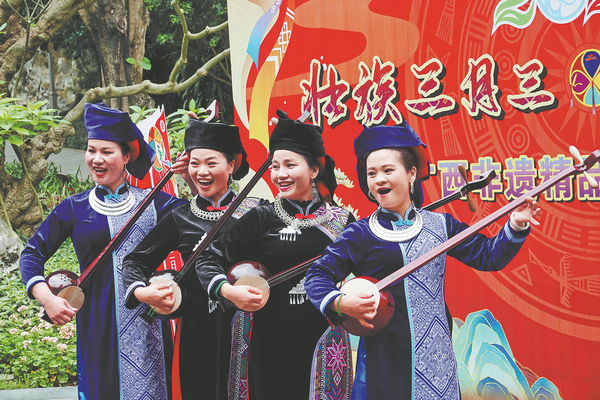Zhuang ritual instrument gets a pop makeover

Local artists perform with the tianqin. YU XIANGQUAN/FOR CHINA DAILY
Lei Ya, one of the band's three songs, features a rap segment about the finger-guessing games at Zhuang feasts. Released in March on several social media platforms, the song has won acclaim from net users.
"Although I don't understand the Zhuang language, the song is absolutely fantastic to listen to," wrote one subscriber on the popular social media platform Douyin.
In another song to celebrate the upcoming inclusion of Longzhou county in the country's bullet-train network, electronic music is integrated along with tianqin music.
This combination of a traditional instrument with pop music has drawn interest from curious viewers. "When we perform at the scenic spot, tourists inquire about the playing techniques and even the cost of a tianqin," says Lu.
Speaking of the difficulties they've encountered in blending the Zhuang language, the tianqin and pop music, Lu says the timbre, frequencies and tones of the instrument sometimes clash with the other instruments.
"We have to do some subtractions," says Lu. "When the tianqin plays a dominant role in the segment, the bass and guitar should give way."
Qin Yan, one of the two tianqin players in the band, adds to this. "In Longzhou county, people speak different Zhuang dialects with slight differences in pronunciation from town to town, which requires us to choose the most fitting pronunciations to rhyme better and sound more natural."
The band's new song, which will be released soon, draws inspiration from childhood lullabies. "Our summer memories of cattail leaf fans, fireflies and starry nights, together with Zhuang ballads, will all be part of the new song," says Qin.
"We think culture has 'roots', which means we cannot create things out of nothing," says Ma Shaogang, the second tianqin player and the band's composer. "Looking forward, we will go on creating pop songs based on the tianqin and other Zhuang ethnic cultural elements, because that is where we come from, our roots."
Xinhua
